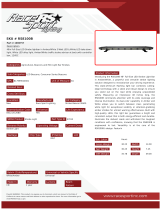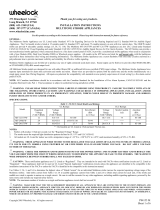Page is loading ...

1 I56-3101-003R
06-10
INSTALLATION AND MAINTENANCE INSTRUCTIONS
Selectable Output Amber Lens Strobes
For use with the following models: SW-ALERT and SWH-ALERT
PRODUCT SPECIFICATIONS
Operating Temperature: 32°F to 120°F (0°C to 49°C)
Humidity Range: 10% to 93% Non-condensing
Strobe Flash Rate: 1 flash per second
Nominal Voltage: Regulated 12VDC/FWR or regulated 24DC/FWR
Operating Voltage Range (includes fire alarm panels with built in sync): 8 to 17.5V (12V nominal) or 16 to 33V (24V nominal)
Operating Voltage with MDL3 Sync Module: 8.5 to 17.5V (12V nominal) or 16.5 to 33V (24V nominal)
Input Terminal Wire Gauge: 12 to 18 AWG
NOTE: Strobes will operate at 12 V nominal for 15 & 15/75 candela settings only. Switching between ranges is automatic.
DIMENSIONS FOR PRODUCTS AND ACCESSORIES MOUNTING BOX OPTIONS
2-Wire Indoor Products
4 × 4 × 2
1
/8,
Single Gang, Double Gang,
4˝ Octagon
WALL PRODUCTS LENGTH WIDTH DEPTH
Strobe (including lens)
5.6˝ 4.7˝ 2.5˝
142 mm 119 mm 64 mm
BBS-2
BBSW-2
Back Box Skirt
5.9˝ 5.0˝ 2.2˝
152 mm 130 mm 57 mm
WARNING: Not to be used as a visual public mode alarm notification appliance. NOTICE: This manual shall be left with the owner/user of this equipment.
GENERAL DESCRIPTION
The SpectrAlert Advance amber lens strobe products offer an amber colored
strobe with the word “ALERT” printed on the white housing to comply with
the latest standard for mass notification systems. They are designed to be used
in 12 or 24 volt, DC or FWR (full wave rectified) systems. Amber lens strobes
are UL Listed under 1638 (Visual Signaling Appliances) for Private Mode Gen-
eral Utility Signaling. Device may be mounted to either wall or ceiling. All
SpectrAlert Advance products are suitable for use in synchronized systems.
The System Sensor MDL3 module may be used to provide synchronization.
LOOP DESIGN AND WIRING
The system designer must make sure that the total current drawn by the de-
vices on the loop does not exceed the current capability of the panel supply,
and that the last device on the circuit is operated within its rated voltage.
The current draw information for making these calculations can be found in
the tables within this manual. For convenience and accuracy, use the voltage
drop calculator on the System Sensor website (www.systemsensor.com) or
CD-ROM.
When calculating the voltage available to the last device, it is necessary to
consider the voltage drop due to the resistance of the wire. The thicker the
wire, the smaller the voltage drop. Wire resistance tables can be obtained
from electrical handbooks. Note that if Class A wiring is installed, the wire
length may be up to twice as long as it would be for circuits that are not fault
tolerant.
CANDELA SELECTION
Adjust the slide switch on the rear of the product to position the desired can-
dela setting in the small window on the front of the unit. For amber lensed
strobes used for full profile measurement, listed candela ratings must be re-
duced in accordance with Table 2. Use Table 1 to determine the current draw
for each candela setting.
NOTE: SpectrAlert products set at 15 and 15/75 candela automatically work
on either 12V or 24V power supplies. The products are not listed for 12V op-
erating voltages when set to any other candela settings.
MOUNTING
1. Attach mounting plate to junction box as shown in Figures 3 and 4. The
mounting plate is compatible with 4” square, double gang, and 4” octa-
gon junction boxes. If using a back box skirt, attach the mounting plate
to the skirt and then attach the entire assembly to the junction box (see
Figures 3 and 4).
2. Connect field wiring to terminals, as shown in Figure 1.
3. If the product is not to be installed at this point, use the paint cover to
prevent contamination of the mounting plate.
4. To attach product to mounting plate, remove the paint cover, then hook
tabs on the product housing into the grooves on mounting plate.
5. Then, swing product into position to engage the pins on the product with
the terminals on the mounting plate. Make sure that the tabs on the back
of the product housing fully engage with the mounting plate.
6. Secure product by tightening the single mounting screw in the front
of the product housing. For tamper resistance, the standard captivated
mounting screw may be replaced with the enclosed Torx screw.
FIGURE 1. WIRING PRODUCT:
+
–
+
–
INPUT
FROM
P
ANEL
OR
PRIOR
DEVICE
OUTPUT
TO NEXT
DEVICE
OR EOL
A0379-00
NOTE: For 24 volt applications, the total number of strobes on a single NAC
must not exceed 40, with a maximum loop resistance of 120 ohms. For 12 volt
applications, the total number of strobes must not exceed 12, with a maxi-
mum loop resistance of 30 ohms.Figure 2. Shorting Spring:
SHORTING SPRING
A0368-00
NOTE: A shorting spring is provided between terminals 2 and 3 of the mount-
ing plate to enable wiring checks after the system has been wired, but prior
I56-3101-003R
3825 Ohio Avenue, St. Charles, Illinois 60174
1.800.SENSOR2; Fax: 630.377.6495
www.systemsensor.com

2 I56-3101-003R
©2016 System Sensor. 06-10
to installation of the final product. This spring will automatically disengage
when the product is installed, to enable supervision of the final system.
TABLE 1. STROBE CURRENT DRAW (MA):
Candela
8–17.5 Volts 16–33 Volts
DC FWR DC FWR
Standard
Candela
Range
15 123 128 66 71
15/75 142 148 77 81
30 NA NA 94 96
75 NA NA 158 153
95 NA NA 181 176
110 NA NA 202 195
115 NA NA 210 205
High
Candela
Range
135 NA NA 228 207
150 NA NA 246 220
177 NA NA 281 251
185 NA NA 286 258
TABLE 2:
Cd Switch Setting
On-Axis Rating
(UL 1638)
Equivalent Cd Rating for
UL1971 Profile
15 15 12
15/75 15/75 15/75
30 30 24
75 75 60
95 95 75
110 110 85
115 115 90
135 135 110
150 150 120
177 177 140
185 185 150
NOTE: UL1971 is not applicable to mass notification devices, but these read
-
ings were obtained using the measurement procedure specified under UL1971.
The horn and/or strobe will not work without power. The horn/strobe gets its power from the fire/
security panel monitoring the alarm system. If power is cut off for any reason, the horn/strobe will not
provide the desired audio or visual warning.
The horn may not be heard. The loudness of the horn meets (or exceeds) current Underwriters
Laboratories’ standards. However, the horn may not alert a sound sleeper or one who has recently used
drugs or has been drinking alcoholic beverages. The horn may not be heard if it is placed on a different
floor from the person in hazard or if placed too far away to be heard over the ambient noise such as
traffic, air conditioners, machinery or music appliances that may prevent alert persons from hearing the
alarm. The horn may not be heard by persons who are hearing impaired.
The signal strobe may not be seen. The electronic visual warning signal uses an extremely reliable xe
-
non flash tube. It flashes at least once every second. The strobe must not be installed in direct sunlight
or areas of high light intensity (over 60 foot candles) where the visual flash might be disregarded or not
seen. The strobe may not be seen by the visually impaired.
The signal strobe may cause seizures. Individuals who have positive photoic response to visual stimuli
with seizures, such as persons with epilepsy, should avoid prolonged exposure to environments in
which strobe signals, including this strobe, are activated.
The signal strobe cannot operate from coded power supplies. Coded power supplies produce interrupted
power. The strobe must have an uninterrupted source of power in order to operate correctly. System
Sensor recommends that the horn and signal strobe always be used in combination so that the risks
from any of the above limitations are minimized.
WARNING
THE LIMITATIONS OF HORN/STROBES
THREE-YEAR LIMITED WARRANTY
System Sensor warrants its enclosed product to be free from defects in materials and workmanship
under normal use and service for a period of three years from date of manufacture. System Sensor
makes no other express warranty for this product. No agent, representative, dealer, or employee of
the Company has the authority to increase or alter the obligations or limitations of this Warranty. The
Company’s obligation of this Warranty shall be limited to the replacement of any part of the product
which is found to be defective in materials or workmanship under normal use and service during the
three year period commencing with the date of manufacture. After phoning System Sensor’s toll free
number 800-SENSOR2 (736-7672) for a Return Authorization number, send defective units postage
prepaid to: Honeywell, 12220 Rojas Drive, Suite 700, El Paso TX 79936, USA. Please include a note
describing the malfunction and suspected cause of failure. The Company shall not be obligated to
replace units which are found to be defective because of damage, unreasonable use, modifications,
or alterations occurring after the date of manufacture. In no case shall the Company be liable for any
consequential or incidental damages for breach of this or any other Warranty, expressed or implied
whatsoever, even if the loss or damage is caused by the Company’s negligence or fault. Some states do
not allow the exclusion or limitation of incidental or consequential damages, so the above limitation or
exclusion may not apply to you. This Warranty gives you specific legal rights, and you may also have
other rights which vary from state to state.
FCC STATEMENT
SpectrAlert Strobes and Horn/Strobes have been tested and found to comply with the limits for a Class
B digital device, pursuant to part 15 of the FCC Rules. These limits are designed to provide reasonable
protection against harmful interference when the equipment is operated in a commercial environment.
This equipment generates, uses, and can radiate radio frequency energy and, if not installed and used
in accordance with the instruction manual, may cause harmful interference to radio communications.
Operation of this equipment in a residential area is likely to cause harmful interference in which case
the user will be required to correct the interference at his own expense.
Please refer to insert for the Limitations of Fire Alarm Systems
FIGURE 3. SURFACE MOUNTING WITH BACK BOX SKIRT:
A0378-00
FIGURE 4. RECESSED MOUNTING:
A0377-00
/

